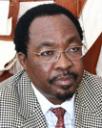A United Nations (UN) rapporteur in marking World Press Freedom day today has cited the four-month ban on CNS Channel Six as an example of a disproportionate sanction.
 The comment by UN Special Rapporteur Ambeyi Ligabo on the case is likely to ratchet up the pressure on the Bharrat Jagdeo administration to cut the penalty on the station owned by CN Sharma. The penalty has been decried as excessive by sections of society here.
The comment by UN Special Rapporteur Ambeyi Ligabo on the case is likely to ratchet up the pressure on the Bharrat Jagdeo administration to cut the penalty on the station owned by CN Sharma. The penalty has been decried as excessive by sections of society here.
In his statement Ligabo said that the more subtle censorship tactics “severely restrict the independence of the press while seemingly allowing states to maintain a façade of respect to democratic principles such as freedom of expression.”
The UN independent expert asserted that: “In this regard, governments have exerted severe economic pressure, including through selective use of state advertisement, aiming to strangle independent media outlets. They have also exploited subjective regulations such as licensing to suspend or shut down the broadcast or printed media.” The withdrawal of advertisements from Stabroek News by the Guyana Government had also been drawn to the attention of Ligabo’s office.
Ligabo further contended that libel lawsuits have similarly been used deliberately as a mechanism to imprison critical journalists or to punish them with disproportionate fines, and he added that examples of these measures abound.
And citing one instance, he said that in Guyana “CNS Channel 6 was suspended for four months for “infringing the terms of its license” after an interviewee, speaking during a live broadcast, called for attacks against the President.”
The impact of these measures, Ligabo contended, is not restricted to the media outlets or journalists they target. “Rather, they serve to create an unsafe and unstable environment for the functioning of the press as a whole, leading them to shun critical reporting and impose self-censorship.”
But there are international legal instruments to protect the right of every citizen to receive information and ideas of all kinds, through any media of his or her choice, Ligabo maintained.
And governments therefore have a legally binding commitment to end censorship, protect a free and independent media and guarantee their right to criticize, he argued.
“Freedom of the press,” he declared, “cannot be applicable exclusively for those with whom we agree. On the contrary, the key to freedom of expression is to respect the rights of those with whom we disagree to voice their own opinion. Without this right, democracy itself cannot flourish.”
President Bharrat Jagdeo last month ordered CNS Channel Six off the air for four months over an on-air licence infringement committed in February, a move that Sharma later referred to as dictatorial, and one that sparked outrage.
In a letter addressed to Sharma and dispatched a few hours after a meeting at his office to determine what would happen to the station’s licence, Jagdeo said he found Sharma’s explanations unsatisfactory as to why the offending broadcasts continued to air on CNS Channel 6, even after Sharma recognised that the content of the programme infringed the conditions of his licence.
Later in a press release the Office of the President (OP) said Sharma was found to have committed serious infringements of the conditions of the licence by broadcasting on four occasions, including three rebroadcasts, content that advocated the killing of the Head of State and Head of Government.
The OP release said Jagdeo is the sole authority vested with power to decide whether a licensee has breached the terms and conditions of their licence and/or the provisions of the Act or the regulations and whether any sanctions may be imposed, adding that the Act provides that the Minister may suspend or cancel the Licence for such breaches.
“Under no circumstances can the Minister allow a Licensee to use the airwaves, without sanction, to advocate the killing of any citizen, moreso a Head of State and Government”, the release added.
The matter is now in court.
New media
And looking at other cases of censorship, the UN Special Rapporteur pointed out that the new media, particularly the Internet, have not remained free of censorship or direct repression. He said that due to its low cost, decentralized nature and large audience, the Internet has become one of the most important means for the circulation of independent ideas. Consequently, it is a key target of attempts to monitor, control and censor the digital media, particularly bloggers, Internet contributors and cyber-dissidents.
Ligabo noted that in some cases, governments have blocked virtually all access to the Internet by its own citizens, such as during the peaceful protests in Myanmar in September 2007, thus thwarting all communication with the outside world. In other cases, Internet access has been allowed but dependent websites, and even “politically sensitive terms” within search engines, remain censored.
He lamented that this has been possible to a large extent due to the complicity of leading Internet corporations that have accepted these limitations, noting that the majority of these are based in democratic countries.
“Worryingly,” the UN Special Rapporteur said, “some Internet companies have even disclosed personal information of their users in order to allow governments to identify and convict internet writers.”







